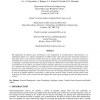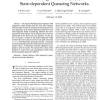597 search results - page 75 / 120 » Combinatorial Models for Cooperation Networks |
JUCS
2008
13 years 9 months ago
2008
: Multi-Agent Systems (MAS) constitute a well known approach in modelling dynamical real world systems. Recently, this technology has been applied to Wireless Communication Systems...
JNSM
2000
13 years 8 months ago
2000
The application of software agent technology to the management of communications' infrastructures is a challenging domain as it requires management on different time scales a...
EOR
2010
13 years 9 months ago
2010
-- The classical Wardrop System Optimum (SO) assignment model assumes that the users will cooperate with each other in order to minimize the overall travel costs. The importance of...
INFOCOM
2006
IEEE
14 years 3 months ago
2006
IEEE
— Although cooperation generally increases the amount of resources available to a community of nodes, thus improving individual and collective performance, it also allows for the...
MOBIHOC
2007
ACM
14 years 8 months ago
2007
ACM
In this paper we study the problem of scheduling wireless links in the geometric SINR model, which explicitly uses the fact that nodes are distributed in the Euclidean plane. We p...


